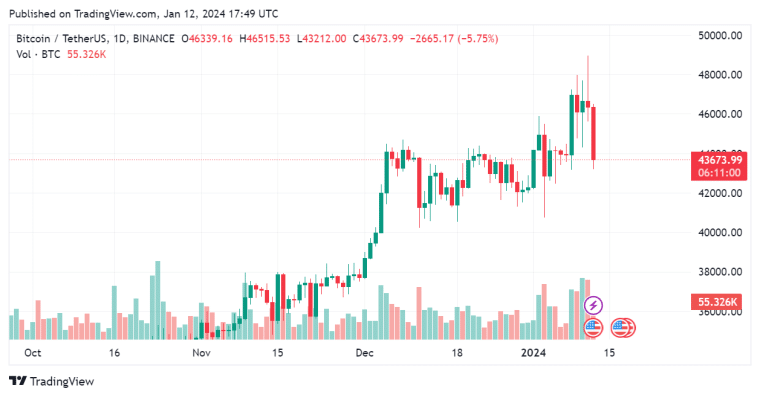The cryptocurrency market has reached a significant milestone with the successful launch of spot Bitcoin Exchange-Traded Funds (ETFs), pushing prices of cryptocurrencies up dramatically and igniting discussions about the potentially imminent arrival of other traditional financial products built on crypto like an Ethereum spot ETF.
Not everyone was happy with the developments, however, with a frustrated Senator Elizabeth Warren saying that the US Securities and Exchange Commission (SEC) made a mistake in approving the ETFs.
This development, a major leap forward for the crypto industry and a significant backtrack by the SEC has garnered both applause and criticism, highlighting the evolving status of digital assets in traditional finance.
The Impressive Debut of Bitcoin ETFs: How Did It Unfold?

Day one trading of spot Bitcoin ETFs witnessed a remarkable $4.5 billion in volume, far exceeding market expectations, BlackRock’s iShares Bitcoin Trust (IBIT) led the charge, contributing significantly to this volume.
Despite a slight downturn by the day’s end, the frenzy marked a historic moment, signifying Wall Street’s pent-up demand for Bitcoin exposure without the complexities of direct asset holding.
In this new era of Bitcoin ETFs, BlackRock wasn’t the only winner. Grayscale also emerged as a big winner.
Its Bitcoin Trust recorded an all-time high in daily trading volume, highlighting the shifting investor preferences towards regulated and accessible crypto investment vehicles.
This transition from a product for accredited investors to a more mainstream offering reflects the growing integration of cryptocurrencies into the broader financial system.
The Path to Approval: Gensler’s Stance and Court Influence Over SEC
The approval of Bitcoin ETFs by the SEC, led by Chair Gary Gensler, came after a landmark court decision favoring Grayscale.
This ruling, which highlighted the inconsistent treatment of similar financial products, played a pivotal role in shifting the SEC’s stance on crypto ETFs according to Gensler on Squawk Box earlier today.
“We have rejected several of these [applications for a spot Bitcoin ETF] in the past, but something has changed. I strongly believe in the rule of law and the importance of the courts, and with a new court ruling in mind, we are moving ahead. I believe this is the best way to proceed.”
Gensler’s acknowledgment of the rule of law and court influence underlines the evolving regulatory regime for cryptocurrencies as they pass into mainstream acceptance.
Spot Ethereum ETFs Soon?: BlackRock’s Vision and Fink’s Endorsement
The crypto community is already looking beyond the basic effects of the new Bitcoin spot ETFs. Attention has swiftly turned to Ethereum, the second-largest cryptocurrency, and the prospect that it may soon be traded in spot ETFs.
Larry Fink, the CEO of BlackRock, the world’s largest asset management firm, said “I see value in having an ETH ETF.” But he didn’t stop there, adding, “As I said, these are just start stepping stones toward tokenization.”
He believes that these spot Bitcoin ETFs won’t just be a stepping stone to other spot crypto ETFs including Ethereum. In his mind, this is only the beginning of a financial and technological revolution.
BlackRock CEO Larry Fink’s endorsement of Bitcoin and Ethereum ETFs as well as the potential of the crypto market in general spotlights the growing interest in diversifying crypto offerings in the traditional finance space.
“These are just stepping stones towards tokenization and I really do believe this is where we’re going to be going,” Fink said.
Multiple spot Ethereum ETF applications have already been filed with the SEC, including one from BlackRock. If these ETFs are approved they would only further cement cryptocurrencies’ role in mainstream investment portfolios.
Political Backlash: Senator Warren’s Critique
Yet, amidst these advancements, some onlookers are critical of the SEC’s decision, namely U.S. Senator Elizabeth Warren. She has long been a critic of cryptocurrency, arguing that it facilitates money laundering and the fentanyl trade, claims that are heavily disputed by the cryptocurrency community.
It was no surprise when she voiced strong criticism against the SEC’s decision, saying that it was “wrong on the law,” despite the decision’s basis in the recent court case.
The @SECgov is wrong on the law and wrong on the policy with respect to the Bitcoin ETF decision.
If the SEC is going to let crypto burrow even deeper into our financial system, then it's more urgent than ever that crypto follow basic anti-money laundering rules.
— Elizabeth Warren (@SenWarren) January 11, 2024
Elizabeth Warren’s concerns center on the deeper integration of crypto into the financial system without stringent anti-money laundering regulations – a claim disputed by the crypto industry.
Her stance reflects the ongoing debate over the balance between innovation and regulatory oversight in the crypto industry, and the controversy surrounding the SEC’s backtrack move.
The Bottom Line: A New Era for Crypto ETFs
The launch of Bitcoin ETFs and the prospect of an Ethereum ETF represent transformative steps for the cryptocurrency market.
As the industry navigates regulatory challenges and political scrutiny, these developments signal a broader acceptance and integration of digital assets into the world of traditional finance.
Now, the crypto community eagerly anticipates further developments, particularly the long-term impact of spot Bitcoin ETFs on token demand-side dynamics, alongside anticipation in the Ethereum ETF space.